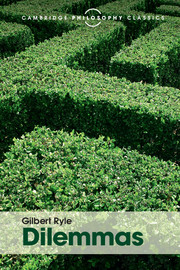3 - Achilles and the tortoise
Published online by Cambridge University Press: 05 November 2015
Summary
I shall now discuss a dilemma which I imagine is familiar to everybody. It is quite certain that a fast runner following a slow runner will overtake him in the end. We can calculate by simple arithmetic after what distance and after what time the chase will be over, given only the initial distance and the speeds of the two runners. The chase will be over in the time it would take to cover the initial interval at the speed of the fast runner minus the speed of the slow runner. The distance covered by the pursuer by the end of the chase is calculable from his actual speed over the ground and the time for which he runs. Nothing could be more decisively settled. Yet there is a very different answer which also seems to follow with equal cogency from the same data. Achilles is in pursuit of the tortoise and before he catches him he has to reach the tortoise's starting-line, by which time the tortoise has advanced a little way ahead of this line. So Achilles has now to make up this new, reduced lead and does so; but by the time he has done this, the tortoise has once again got a little bit further ahead. Ahead of each lead that Achilles makes up, there always remains a further, though always diminished lead for him still to make up. There is no number of such leads at the end of which no lead remains to be made up. So Achilles never catches the tortoise. He whittles down the distance, but never whittles it down to nothing. Notice that at each stage the tortoise's lead is a finite one. If Achilles has whittled off ten or a thousand such ever dwindling leads one after another, the lead still to be made up is of finite length. We cannot say that after such and such a number of stages, the tortoise's lead will have shrunk to the dimensions of an Euclidean point. If Achilles takes any time at all to make up a lead, he gives time for the tortoise to get some way past the terminus of that lead. The same result follows if we consider intervals of time instead of distances in space.
- Type
- Chapter
- Information
- DilemmasThe Tarner Lectures 1953, pp. 31 - 45Publisher: Cambridge University PressPrint publication year: 2015

